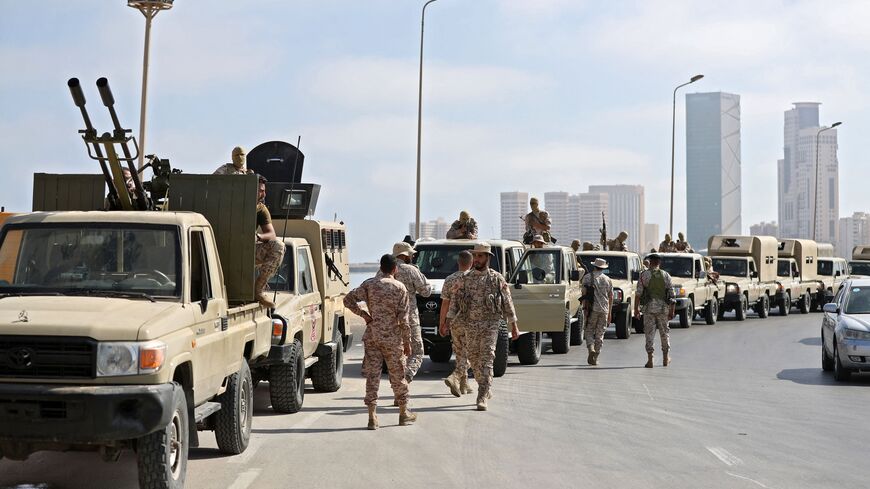The United Arab Emirates (UAE) and Qatar played an active role in the military campaign to overthrow Moammar Gadhafi back in 2011. Since then, Abu Dhabi’s and Doha’s approaches to Libya have evolved tremendously but have always been characterized by rivalry and an aggressive foreign policy that targets each other’s efforts, allies and proxies in Libya.
Following the overthrow of Gadhafi, the Qatari-Emirati rivalry in Libya went through phases of competing aggressive policies inside Libya. This included targeted media campaigns, the funding of various Libyan media outlets and social media pages, the use of Twitter and Facebook bots, and at times even direct military and financial support to their Libyan proxies and allies.
Notably, Qatar and the UAE have adopted two very different approaches to the kind of alliances they sought to build in Libya. While Qatar developed alliances with Islamist and hard-line revolutionary currents, the UAE developed alliances with nationalist and non-Islamist leaning currents.
Islamists vs. nationalists
Between 2011-2014, Qatar had the upper hand in Libya with its allies and proxies spread across the country through military and political alliances. Doha’s allies had the upper hand in the National Transitional Council (NTC) and after that the General National Congress (GNC), despite the fact that the National Forces alliance led by the late Mahmoud Jibril won the popular vote and around 50% of seats were allocated to party lists in the 2012 elections.
The UAE’s allies, on the other hand, faced one setback after another during that period. The situation changed in 2014 when Khalifa Hifter became Abu Dhabi’s principal ally in Libya and the balance of power started to favor the UAE after the launch of Operation Dignity in eastern Libya. By 2017, the Libyan National Army (LNA) took control of Benghazi and Derna, and Qatar’s Islamist allies in both cities were defeated. In Tripoli, the GNC factions that rejected the Libyan Political Agreement (LPA, or Skhirat agreement) led by Nuri Abu Sahmain and the Government of National Salvation led by Khalifa al-Ghwell were routed out of Tripoli by pro-Government of National Accord (GNA) armed groups in Tripoli.
As a result of that shift, many Islamist figures, including the Grand Mufti of Libya Sadiq al-Gheryani , and former leaders of Libyan Islamic groups Khalid al-Sharif and Abdulhakim Belhaj, had to flee Libya in 2016 and reside between Qatar and Turkey. By then, the UAE and its allies in Libya felt emboldened, and through direct mediation between Fayez al-Sarraj and Hifter, the UAE sought to find a way to ensure that its allies could gain control of Tripoli. However, the 2019 Abu Dhabi meeting and the consequent accord between Sarraj and Hifter failed due to opposition from armed groups in Tripoli, and the UAE ended up spearheading and supporting Hifter's decision to go to war in order to take control of the capital, Tripoli. That was a step too far for the UAE and a strategy that backfired since it caused huge reputational damage for Abu Dhabi on the international stage and locally. Furthermore, its main ally, Hifter, was humiliated militarily at the hands of Turkey and forces aligned with it in Tripoli and Misrata. The end of the war in 2020 signaled the beginning of a shift in the UAE’s strategy in Libya, a more nuanced and transactional strategy that was promptly enacted throughout 2021 and 2022.
A UAE recalibration after 2020
Following the end of the battle in Tripoli in 2020 and the defeat of the LNA, the UAE paused and recalibrated its approach to Libya. In 2020, the UAE assessed that it had lost years of investment in its relationships and influence networks building in eastern Libya to Egypt, which managed to mediate a truce between Agila Saleh and Hifter in May 2020 and took the lead as far as political and diplomatic engagement in the eastern region was concerned. Subsequently, the Emiratis became heavily involved in the UN-led Libyan Political Dialogue Forum (LPDF) and managed to use their personal links to Libyan stakeholders as well as business diplomacy to achieve what they could not achieve through their support for the LNA’s military operation in 2019. The UAE went against its close allies in France and Egypt and chose to support the Dbeibah-Menfi list in Geneva against the Bashagha-Saleh list that was supported by Paris and Cairo.
#Libya- 2022 concluding ceremony for #LNA 106 Brigade, headed by its commander, Brigadier General Khaled Haftar.
— Oded Berkowitz (@Oded121351) January 26, 2023
106 Brigade, by its size, resource allocation, combined arms (including dedicated Air Force elements) and of course commander, is turning into an army within an "army" pic.twitter.com/fcgiWx7DxR
Although the Qataris were supportive of the Dbeibah-Menfi list in Geneva and were largely in harmony with Turkey as far as the LPDF’s outcomes were concerned, they were not impressed by the growing Emirati influence in Tripoli following Abdul Hamid Dbeibah's win and takeover of power in Tripoli. Indeed, the Emiratis have gained significant influence in Tripoli and built relationships with key security interlocutors such as the current acting Minister of Interior Emad al-Trabulsi and armed groups there such as the Support and Stability Group led by Ghnewa al-Kikli, and 301 brigade led by Abdulsalam Zubi as well as secured the appointment of Farhat Bengdara at the top of the National Oil Corporation in a bid to increase their chances of securing a lucrative share in Libya’s energy sector — a deal that they are already reaping the benefits of. Nonetheless, the Qataris were happy to see their longtime Libyan allies who were displaced out of the country since 2016 make a return and regain some kind of foothold in Tripoli.
In response to Abu Dhabi’s proactive approach in Tripoli, Doha has been building relationships in eastern Libya, including with figures inside the LNA such as Hifter's son Belgasim and high-ranking LNA officers who are pro-February 17 revolution, as well as Libyan House of Representatives Speaker Agila Saleh and a growing number of House of Representative members. The Libyan Observer reported on those meetings.
Despite the significant reduction in aggressive actions by the various countries intervening in Libya since the signing of the cease-fire in 2020, the root causes of the ideological tensions and strategic rivalry between the UAE and Qatar in Libya remain. Qatar continues to adopt a pro-Arab Spring and pro-Islamist agenda in its engagement with Libya. As for the UAE, despite the recalibration of its approach in Libya, the overall strategic view remains the same.
Even when Abu Dhabi sought to diversify its partnerships away from Hifter and the LNA, they chose to build bridges and relationships with former regime figures such as Dbeibah and even Saif al-Islam Gaddafi, whose top aides reside mainly in Dubai and Abu Dhabi. A direction which remains in line with the UAE’s post-2011 anti-Islamist and anti-hardline revolutionary position The UAE is seeking to build an alliance that would bring together Hifter and former regime currents in such a way as to create a winning political and military alliance. Additionally, the UAE is working to place itself as an essential partner for Cairo in Tripoli, yet at the same Abu Dhabi is placing itself as the gatekeeper to eastern Libya as far as Ankara is concerned, given that Turkey’s strategic eastern Mediterranean interests are geographically linked to the coastal areas of the eastern cities of Derna and Tobruk with which Turkey claims to have maritime borders.








